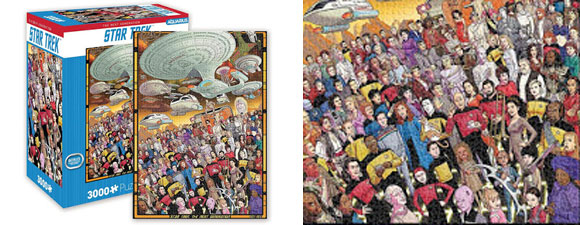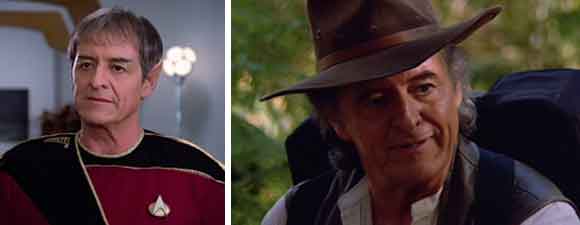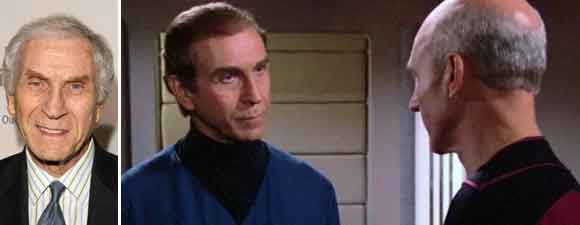Retro Review: The First Duty
8 min readWhen a stunt leads to a deadly collision, Wesley Crusher gets involved in a cover-up to protect his friends at the Academy.
Plot Summary: The Enterprise is on the way to Earth, where Picard is scheduled to address this year’s graduating class at Starfleet Academy, which includes Wesley Crusher. Admiral Brand hails with the unhappy news that Wesley’s flight squadron has had a terrible accident. Wesley is fine, but all five students’ ships were destroyed and one student has died. Wesley’s squadron leader, Nicholas Locarno, encourages the rest of the team not to volunteer any information. When Brand observes that the flight plan did not match the one filed by the navigator, Nick tells the investigators that they made small changes because Joshua Albert, the dead student, had been having panic attacks and lost control during the flight. Joshua’s father Commander Albert takes the news very hard, visiting Wesley to return a jacket of Wesley’s that he found in Joshua’s room and apologizing for the fact that Joshua let Nova Squadron down. Wesley tells Nick that he is not comfortable blaming Joshua for an accident in which they all share the blame, but Nick insists that Joshua would want the team to stay together and protect their futures. When the inquiry reconvenes, Wesley is asked about data from his flight recorder and shown an image from a satellite that directly contradicts the information he gives about the squadron’s maneuvers just before the accident. Wesley cannot explain the deviation and Brand is disturbed. Afraid that her son will be blamed for the accident, Crusher asks Picard to conduct his own investigation, which leads to LaForge’s discovery that Wesley was purging his plasma exhaust just before the ships exploded. Picard realizes that the squadron was attempting to perform an illegal Kolvoord Starburst, banned because its last performance at the Academy killed all five students involved. Picard demands that Wesley tell the truth at the inquiry or he will tell the admiral his suspicions. Nick begs Wesley to think of the good of the team, but Wesley explains just as the inquiry is about to be closed that they attempted the illegal maneuver. Picard tells Wesley that later that Nick has been expelled and that Wesley and the others will have to repeat their last year at the Academy.
Analysis: Finally Wesley Crusher gets a worthy episode – a real story about growing up, not some contrived situation where a boy genius saves the ship. It’s one of Wil Wheaton’s best performances – understated yet emotional, and at this point the interactions between the characters are so familiar that I completely believe Beverly Crusher is Wesley’s mother and Jean-Luc Picard is his hero. We’ve mostly seen Wesley as unnaturally mature, at ease as a leader, sensible about risks, so there’s something almost comforting about seeing him screw up so spectacularly, despite the tragic consequences. A failure of this magnitude will surely help him grow up, and it’s just as well he experienced it while still a student, rather than once he was already serving in Starfleet when the consequences could have been so much more severe. I think it’s a shame we don’t get any real sense of the boy who died, because that would add a different dimension to the tragedy; we’re told he’s Wesley’s friend, but Wesley’s personal grief remains distant in this story as he tries to cope instead with the aftermath of an accident he knows full well should never have happened. His attachment to Nick seems much greater than his attachment to Joshua could ever have been, since his primary emotions are not guilt and devastation at the loss of a close friend, but the same desire to protect the team that Nick preaches at all of them. In the end it isn’t duty to the truth or responsibility to Josh and his family that motivates Wesley to speak, but his inability to let down someone who matters to him even more as a leader and supporter than Nicholas Locarno. He tells the truth out of loyalty to Picard.
In terms of Picard, however, “The First Duty” is a bit of a frustrating story. We get tantalizing hints that Picard once screwed up almost as badly as Wesley – something that threatened his entire Starfleet career – yet we don’t get details, just a handful of scenes with the wonderful Boothby whom Picard had suggested that Wesley look up when he first departed for the Academy. Boothby, we learn, was more certain that Picard would succeed than Picard himself, even though Boothby didn’t think Picard was as good a wrestler as the young Jean-Luc proved himself to be. Yet Boothby found out some weakness of Picard’s and insisted that he rectify it. We never learn the details. Boothby claims he just helped Picard listen to himself, yet from the level of Picard’s resistance – he said he considered Boothby a vicious, mean-spirited old man – I wonder whether there was the same threat of public exposure with which Picard faces Wesley now. Obviously Picard took an important leadership lesson from Wesley, since his approach is not to show compassion for the mistake and attempt to identify with Wesley’s confusion, but to express outrage and insist that there should be no dilemma: Wesley’s only duty is to the truth.
It’s a credit to the writers and to Robert Duncan McNeill that Nick Locarno comes across so strongly in opposition to this. He could easily seem like a bully or a sleazeball, yet he comes across as completely sincere, devoted, passionate in his belief that he is doing the best thing not only for himself but for all the members of Nova Squadron and perhaps for their Starfleet classmates as well. It’s impossible to look at Nick and not see a young Tom Paris, so it’s hard not to make comparisons, since I always found Tom somewhat disappointing. Sure, Paris ended up being a good Starfleet officer, but he never had the edge that one would expect from someone who’d screwed up and gotten friends killed, then joined the Maquis – he was neither a rebel nor a hotshot. Nick is a bit of both; Boothby believes he wanted to graduate a living legend, yet glory for Nick is something to be shared. It’s very important to him that his team succeed and that they consider him a friend as well as the squadron leader. He’s never competitive, never threatening – he doesn’t think he needs to be. He exudes confidence. If he’s hard to forgive, it’s not because he asked Joshua to try the starburst, then talked the others into covering it up; it’s because he never seems to have doubted that the starburst was worth trying despite the cost, and he’s surprised that Wesley might need to be persuaded that some abstract duty to the truth isn’t nearly as important as being part of a team. In the end, Nick confesses to his sins in detail not because he understands that he was wrong all along, but because his taking responsibility will save the others. Picard declares that the first duty of every Starfleet officer is to the truth, yet we’ve seen Enterprise officers fudge the truth in the name of teamwork before, to stall for time, to protect a stumbling colleague. Though Nick has crossed an ethical line, he thinks he is being true to himself and his values.
Offsetting Nick’s charisma is Commander Albert’s tight-lipped agony – not only has he lost his child, but he believes that child was nearly responsible for getting his friends killed as well. It’s easy to forgive Wesley for hiding details from an admiral to try to save his career, much harder to forgive his silence when Albert comes to thank him for being Joshua’s friend. We might have a very different opinion of Nick had we seen him lying to Albert with the same ease with which he misleads questioners at the inquiry. Wesley’s obviously feeling guilt, though it’s hard to place exactly. When he tells his mother to stay out of any further investigations, is he trying to protect her from his own shame, or afraid that she and her colleagues will easily uncover the facts Starfleet Academy can’t see? Is his conscience bothering him from the start, or is there a part of him, as Nick suggests, who wants to be the hero among the disgraced squadron by being the one to step forward? I like that it isn’t simple – that this is not the obnoxious young Wesley from the Enterprise who always had a confident proclamation about the right thing to do in any situation. It’s always been tempting to wonder whether Wesley was offered too much, too soon aboard the Enterprise, and here we get an inkling that it’s probably so. From the time Picard gives him a job on the bridge in his early teens, Wesley is probably incapable of having a normal Academy experience and a normal career; he’s going to push too hard in some areas and try to skip over others. I don’t think it’s the rigors of an extra year at the Academy that will eventually drive him to leave Starfleet, but the same inner frustration that makes someone like Nicholas Locarno look admirable to him.
I would be remiss not to note the magnificent setting of Starfleet Academy at the Tillman Water Reclamation Plant outside Los Angeles. Picard talks to Boothby in the Japanese garden behind the administrative building that serves as the Academy’s main structure (with the Golden Gate Bridge digitally inserted since Starfleet Command is supposed to be in San Francisco). My brother and sister-in-law got married in the tea house there, so I feel a special attachment to the place, but the setting is used beautifully to show us Boothby as gardener and nurturer – even Picard gets his hands dirty. The directing is powerful as well, not only on location, but in the private scenes such as when the three other cadets end up facing Wesley as he remains the lone holdout wondering about their obligation to protect Josh’s memory instead of protecting themselves. Even fans who don’t like Wesley Crusher have a duty to admit that this is a very well-constructed episode.






